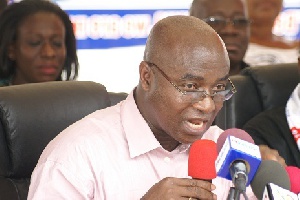THE MINORITY New Patriotic Party (NPP) in Parliament has advised Casiel Ato Forson, a Deputy Minister of Finance and Economic Planning, to read the technical memorandum of understanding (TMoU) that was attached to the International Monetary Fund’s (IMF’s) recent 3-year extended credit facility (ECF) to the Government of Ghana, and acquaint himself with the definition of the word “government” in the agreement to enable him make informed statements.
According to the minority members, reading the document would afford the deputy minister a better understanding of which parties signed the agreement, in view of the ‘convoluted response’ he (Mr Forson) chose to give to their request for the loan to be approved by parliament first.
Osei Kyei-Mensah-Bonsu, Minority Leader, pointed out that paragraph one of the Letter of Intent (LOI) dated March 20, 2015, by the Government to the IMF stated: “The Government of Ghana hereby requests approval of a three-year arrangement under the Extended Credit Facility (ECF) covering the period of 2015 – 2017 in an amount of SDR664.20 million (180 percent of Ghana’s quota) to support its new economic program.”
“What are these facts which we think should have informed Mr Ato Forson’s statement in his capacity as a deputy minister of finance, professional accountant and a member of the Board of Governors of the Bank of Ghana?
“First, Mr Ato Forson, as a deputy minister of state and Member of Parliament, should be aware that the IMF as an institution, only lends to member states, not institutions of its member states such as the Bank of Ghana and that this has been the case since Ghana joined the IMF in the late 1950s. Is Hon Ato Forson not aware of this rudimentary fact?
“Second, the minister must be aware that the current arrangement – the Extended Credit Facility (ECF) – is a lending facility used to support balance of payment (BOP) problems. Here we wish to draw the minister’s attention to the operative words: lending and balance of payments. Lending simply implies a loan. Furthermore, what is BOP? The concept of BOP is only made with reference to countries, not to institutions of countries. In other words, the ECF cannot be given to the BoG since it cannot have a BOP as the minister’s response sought to suggest.”
Mentioning that the Central Bank is a custodian of Government funds, the minority continued that notwithstanding such autonomy or independence, “such attributes do not qualify the BoG to borrow from the IMF and we expected that as a board member of the BoG, the deputy minister was aware of this fact. In any case, since when did our Central Bank – BoG – become a profit-making enterprise such that it can suddenly decide on its own accord to borrow almost US$1 billion from the IMF?”
Reacting to the request not to disburse funds to the Government, the IMF declared that it would not meddle in a raging debate, adding that it was not in the position to determine what the law stipulates of a member country concerning such an agreement.
Barely a week ago, the minority at a press conference stated that the Government had violated Article 181 of Ghana’s Constitution by going for the IMF bailout loan without first seeking approval from parliament.
The minority, as a consequence, requested the IMF, as a matter of urgency, to stop any further disbursement to the Government until the deal was first approved by parliament. But Government quickly set in, describing the minority’s position as ignorant and ill-informed.
Mr Ato Forson, who reacted to the call on behalf of the Government, said the ECF was between the Central Bank and the IMF and therefore did not require parliamentary approval.
General News of Tuesday, 15 September 2015
Source: Daily Guide

















